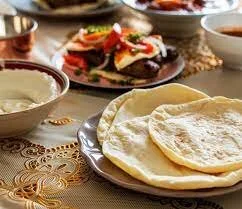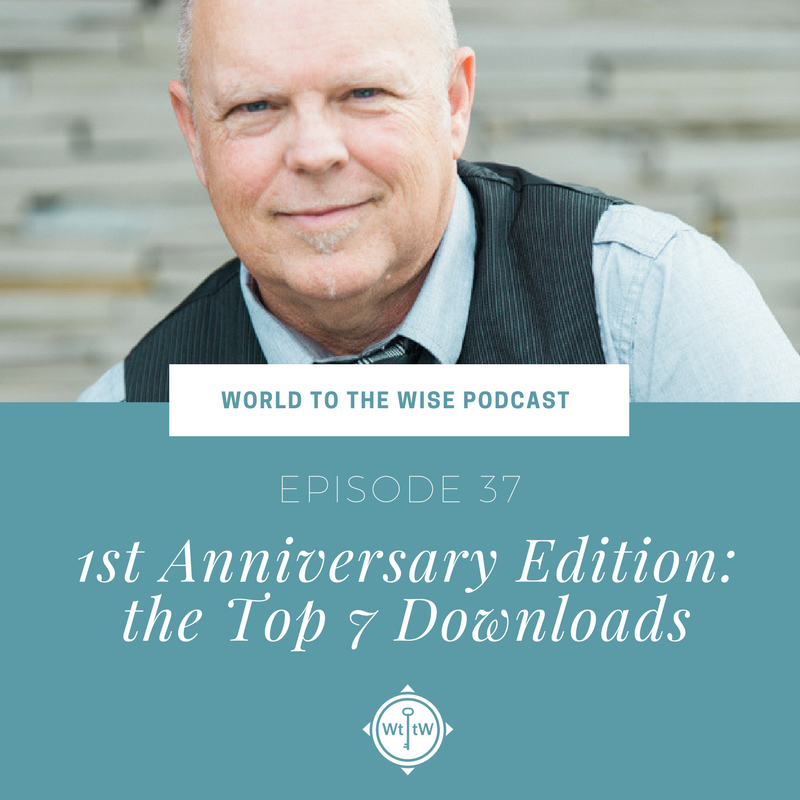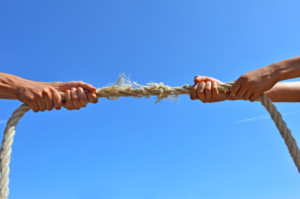Just a few days ago, the month-long fasting season of Ramadan ended for the Muslim world. Do you have any Muslim neighbors, co-workers or friends?
Being Muslim in America
I live in Nashville, which is in the middle of a boom. People are moving here in droves, cranes dot the skyline, and we currently bear the moniker of “It City.” In the trendy, extremely gentrified neighborhood called 12 South, among the hip restaurants, bars, and coffee shops, is a building some might consider out of place: the Islamic Center of Nashville.
This is where I met up with this week’s guest. I walked in the front door and took my shoes off, like everyone else, to the sound of prayers being chanted (in Arabic, of course), and a handful of men at the front of the carpeted main room standing with heads bowed. There was no way I was going to go unnoticed here. I sat down on a chair in the small lobby to wait for Rashed Fakhruddin, President of the Islamic Center. But before he came and ushered me into the office just off the lobby, a number of men invited me inside to where the prayer was happening. “It’s OK, please come in!”
Rashed, a mild-mannered brown-skinned man with an easy smile, arrived and we settled in for what I hope for you is an enlightening and interesting conversation on Islam, being a Muslim in America, and common misconceptions many non-Muslims have. Meet Rashed Fakhruddin.
If the end of the interview sounds a little abrupt, it’s because Rashed heard another call to prayer in the main room of the mosque and had to rush in to participate. I’m not sure whether that was because he is president, or just that as a faithful Muslim he is very committed to showing up for prayer five times a day. Whatever the case, I’m sure our paths will cross again, and I’ll likely have more questions for him. Do you have questions about Islam? Comments? Have we sent you running the other direction? Let us know by leaving a comment on this page.
And while you’re here, please consider becoming a patron so we can continue the work of fostering cultural curiosity.
Thanks for listening!
1st Anniversary Edition: the Top 7 Downloads
This weekend marks the first anniversary of the launch of the World to the Wise podcast. For me personally, it’s been more fun than should be legal – to talk to so many fascinating people, hear their stories, and pass these stories on to you so we can all grow and be challenged together. Challenged to broaden our perspectives and travel vicariously to other parts of the world; or, as the case may be, to other subcultures within our own borders. To mark the occasion we’ve decided to do a roundup of the top seven downloaded episodes from this first year of our existence. We thought this would not only be a great way to celebrate, but also give you a chance to hear a synopsis of some episodes you might not have caught so you can go back and listen. It’s never too late to catch an episode because you can just click on the podcast tab on this website.
Here are the top seven most downloaded episodes from the first year of this podcast adventure:
- Dr. Lee Camp, professor of theology and ethics at Lipscomb University. Lee discusses his insightful and incisive book, Who is My Enemy: Questions Americans Must Ask About Islam -- and Themselves. A great interview with a thoughtful man, and a must read!
- Drs. Eric and Rachel McLaughlin, an internist and OBGYN, respectively, at Kibuye Hope Hospital in the impoverished East African nation of Burundi. You'll find their work and their words inspiring.
- From the land of New Zealand, our dear friends Neil and Jill White are given the chance to brag on their fair country, where Becky and I enjoyed an unforgettable visit a couple of years ago. You should save your money (or miles, as we did) and go -- and stay at the Whites' Air Bnb!
- Author, entrepreneur and adventurer Chris Guillebeau talks about his quest to visit every country on the planet. Chris shares about lessons learned in all his travels, and he also has a lot to teach us about thinking outside the box -- entrepreneurially!
- Author and speaker Sarah Lanier is a long-time friend and former colleague who has a wealth of knowledge and experience to share in the area of cross-cultural dynamics and communication. In this interview we discuss her book, Foreign to Familiar: A Guide to Understanding Hot- and Cold-Climate Cultures. Don't let the title intimidate you -- this is a short but powerful read, where Sarah leads us into a greater understanding of the basic cultural differences between people groups and the importance of this understanding. A must read -- in fact, it's required reading for our Global Studies students!
- If you haven't already, you'll fall in love with Eleni Melirrytou, of Athens, Greece. Nowhere is there a bigger heart to serve the displaced people of this world; they have come by the hundreds through the doors of her downtown Athens church, been fed by her, loved by her, changed by her. Her testimonial will stretch the corners of your heart and challenge your thinking about the worldwide refugee crisis -- and perhaps the refugees in your own city.
- Number seven comes from our series on American subcultures. Bill Moser was a successful architect living in an upscale suburb of Detroit when he met some people who changed the course of his life. Bill and his wife became Amish. The radical change in his belief system and, consequently, lifestyle is nothing short of fascinating, as told through his childhood friend, Jeff Smith, in the book Becoming Amish.
We could go on and talk about the next seven, and the next...but we'll let you discover those for yourself.
Thank you to those of you who have been faithful listeners over this exciting first year! We realize what a privilege it is to be "in your ears" every week!
Dave Dillard Interview
My wife Becky and I have been very impacted by the plight of the hundreds of thousands of refugees who have flooded into Europe in the past year, primarily from war torn countries such as Syria. Thousands of these men, women and children are currently stranded in Greece, their point of arrival in Europe. We have committed to volunteering in Greece this summer with a Nashville-based nonprofit called Servant Group International, whose executive director is Dave Dillard. Turn up your curiosity and listen to Dave's wisdom and experience. You'll also learn about the world's largest ethnic group without a home state.
Sunni? Shiite? Why Care? Part 2
(For part 1 of this post, click here.)
Misconception number 2: There is no significant difference between Sunni and Shiite.
So here's the deal: After the prophet *Muhammad died in 632 AD, his followers decided a leader should be chosen to lead the people and settle disputes as the prophet had done. This office was called the khalifa ("successor"), or caliph. The first caliph was Muhammad's friend, Abu Bakr. The next three caliphs were also close friends or relatives of Muhammad, including his son-in-law, Ali. (Ali's wife was Fatima, daughter of Muhammad.) Ali was murdered by a disgruntled follower, and his rival, Mu-awiyah, became the first caliph of a powerful dynasty called the Umayyad dynasty. But Ali's son, Husayn, wasn't going to take this lying down. His army fought the Umayyads, but Husayn and many of his followers were massacred.
So here is the historical explanation of the Sunni-Shiite conflict: the majority of Muslims (about 85%), known as the Sunni, believed that the caliph was primarily a political and military leader, not a religious authority. The minority Shiites (10-15%), those who followed Ali and Husayn, believed that the caliph must be a descendant of Ali, through Fatima.
Today, if you ask a Sunni or a Shiite to explain their differences, however, you may hear other reasons. The doctrinal differences that initially divided the two groups are given greater or lesser importance, depending on whom you ask. There are certainly political and religious differences: Shiites generally do not acknowledge the authority of elected government officials, holding to the belief that all authority -- political AND religious -- should be in the hands of the imam, or Muslim cleric, whom they believe to be without sin. This is why the Supreme Leader of Iran, for example, is Ali Khamenei, an imam, not the president, Hassan Rouhani. The Sunni-Shia divide can also be seen in certain rituals such as prayer and marriage.
Are these differences essential and crucial to all Muslims? No. Millions of Muslims prefer to simply refer to themselves as Muslim. The reason you might have the impression that all Muslims are militant on either one side or the other is, just as in most situations (American politics comes to mind), it is the extremists who make the most noise. In some regions it has become more like an intense sibling rivalry and a competition for power and territory. Think of the conflict in Northern Ireland between Protestants and Catholics: if one of each sat down across from each other, their debate (to put it kindly) would not be over the worship of Mary or the sale of indulgences. It would be other hostilities that have festered for generation upon generation. It would be over the fact that So-and-so killed my uncle or my cousin. In truth, many of the Middle Eastern conflicts are not religious conflicts at all. Often cloaked in religious language, they are power struggles. They are tribalism alive and well. They are the Capulets and the Montagues.
This is important as we attempt to follow ever-changing developments in the Middle East and other areas of conflict among Muslims. Iran, along with Lebanon and most of Iraq, is primarily Shiite. Saudi Arabia, an ally of the U.S. (that's another discussion), is majority Sunni. At this writing, the tension between Shiite Iran and Sunni Saudi Arabia is so high that diplomatic relations have been severed.
You cannot understand the dynamics of the Iraq War OR the Iran-Saudi tensions unless you get this Sunni-Shiite piece. I am no foreign policy expert, but apparently neither were the decision makers in charge of the first American invasion of Iraq. The vacuum and ensuing civil war that followed the toppling of Saddam Hussein were all about the power struggle between Sunni and Shia (not to mention hundreds of splinter groups on each side), and the ongoing instability because of this is something the Americans would have done well to anticipate. Although Saddam had a strangle hold on the power in Iraq, he was a Sunni, who are in the minority in Iraq. So when he was yanked out of power by the American-led coalition, what ensued was a power struggle that is still going on and blocking this war-torn nation from stability. It is becoming increasingly more clear that neither the US nor any other Western power will be able to bring an end to these hostilities that existed long before the first American soldier set foot on Iraqi soil.
For a concise and objective explanation of this epic struggle, I recommend you listen to this brief clip from PRI's The World.
And ISIS? That's yet another story. Stay tuned.
*You'll see different spellings of the prophet's name (e.g. Mohammed), as they are all approximate transcriptions from the Arabic.







